Related Research Articles

Saddam Hussein was an Iraqi politician and revolutionary who served as the fifth president of Iraq from 1979 to 2003. He also served as prime minister of Iraq from 1979 to 1991 and later from 1994 to 2003. He was a leading member of the revolutionary Arab Socialist Ba'ath Party and later its Iraqi regional branch. Ideologically, he espoused Ba'athism, a mix of Arab nationalism and Arab socialism, while the policies and political ideas he championed are collectively known as Saddamism.

The Arab Socialist Baʿth Party, also anglicized as Ba'ath in loose transcription, with baʿth meaning resurrection, was a political party founded in Syria by Mishel ʿAflaq, Ṣalāḥ al-Dīn al-Bīṭār, and associates of Zakī al-ʾArsūzī. The party espoused Baʿathism, which is an ideology mixing Arab nationalist, pan-Arab, Arab socialist, and anti-imperialist interests. Baʿthism calls for the unification of the Arab world into a single state. Its motto, "Unity, Liberty, Socialism", refers to Arab unity, and freedom from non-Arab control and interference.
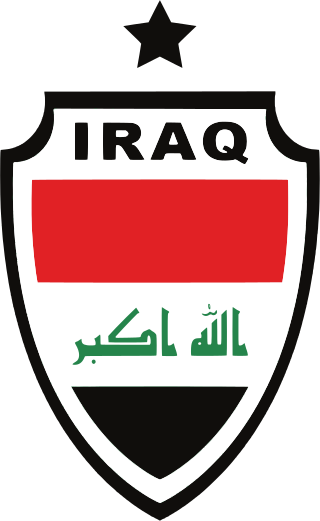
The Iraq national football team represents Iraq in men's international football and is controlled by the Iraq Football Association (IFA), the governing body for football in Iraq. Iraq's usual home venue is the Basra International Stadium.
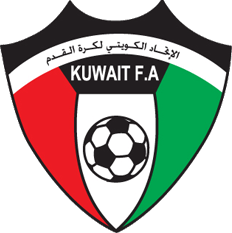
The Kuwait national football team is the national team of Kuwait and is controlled by the Kuwait Football Association. Kuwait made one World Cup finals appearance, in 1982, managing one point in the group stages. In the Asian Cup, Kuwait reached the final in 1976 and won the tournament in 1980.
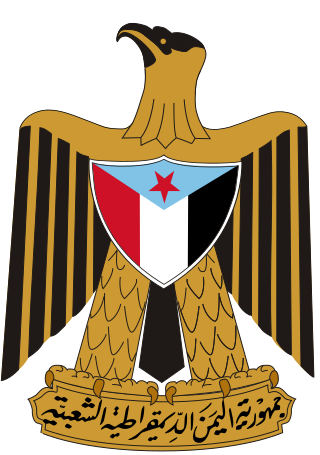
The South Yemen national football team, recognised as Yemen DPR by FIFA, represented South Yemen in men's international football, playing as one of two Yemeni teams, along with North Yemen.

The Iraqi War of Independence or Great Iraqi Revolution began in Baghdad in the summer of 1920 with mass demonstrations by Iraqis, including protests by embittered officers from the old Ottoman Army, against the British who published the new land ownership and the burial taxes at Najaf. The revolt gained momentum when it spread to the largely tribal Shia regions of the middle and lower Euphrates. Sheikh Mehdi Al-Khalissi was a prominent Shia leader of the revolt. Using heavy artillery and aerial bombardment, the uprising was suppressed by the British.
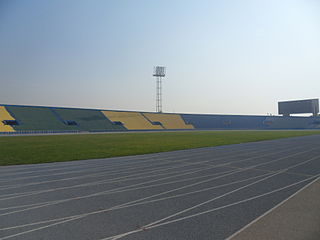
Al-Shaab International Stadium is an all-seater multi-purpose stadium in Baghdad, Iraq. The 35,700-seater was the home stadium of the Iraq national football team, as well as the largest stadium in Iraq, from its opening on 6 November 1966 until the Basra International Stadium was opened in 2013. It is owned by the government of Iraq.
The Arabian Gulf Cup, often referred to simply as the Gulf Cup, is a biennial football competition governed by the Arab Gulf Cup Football Federation for its eight member nations. The history of the competition has also seen it held every three to four years due to political or organisational problems. The reigning champions are Iraq, having won their fourth title at the 25th edition, as hosts, held in 2023.

Al-Zawraa Sports Club is an Iraqi professional sports club based in Utayfia, Karkh District, Baghdad. Their football team competes in the Iraq Stars League, the top-flight of Iraqi football. Al-Zawraa have won the most major honours of any club in Iraq, having won 14 league titles, 16 Iraq FA Cups and 5 Iraqi Super Cups—all record totals.

Diplomatic relations between Iraq and the United States began when the U.S. first recognized Iraq on January 9, 1930, with the signing of the Anglo-American-Iraqi Convention in London by Charles G. Dawes, U.S. Ambassador to the United Kingdom. The historiography of Iraq—United States relations prior to the 1980s is considered relatively underdeveloped, with the first in-depth academic studies being published in the 2010s. Today, the United States and Iraq both consider themselves as strategic partners, given the American political and military involvement after the invasion of Iraq and their mutual, deep-rooted relationship that followed. The United States provides the Iraqi security forces hundreds of millions of dollars of military aid and training annually as well as uses its military bases.
The Iraq Central FA Premier League, also known as the Iraq Central FA First Division and previously named the Iraq FA Baghdad First Division, was the top-level division of football in Baghdad and its neighbouring cities between 1948 and 1973.

The Ramadan Revolution, also referred to as the 8 February Revolution and the February 1963 coup d'état in Iraq, was a military coup by the Iraqi branch of the Ba'ath Party which overthrew the Prime Minister of Iraq, Abdul-Karim Qasim in 1963. It took place between 8 and 10 February 1963. Qasim's former deputy, Abdul Salam Arif, who was not a Ba'athist, was given the largely ceremonial title of President, while prominent Ba'athist general Ahmed Hassan al-Bakr was named Prime Minister. The most powerful leader of the new government was the secretary general of the Iraqi Ba'ath Party, Ali Salih al-Sa'di, who controlled the National Guard militia and organized a massacre of hundreds—if not thousands—of suspected communists and other dissidents following the coup.
Douglas Aziz Shamasha Eshaya is an Iraqi former football player and caretaker coach. He represented the Iraq national team, and is ethnically Assyrian.
Raad Hammoudi Salman al-Aredhi is a retired Iraqi football player who represented his country as a goalkeeper in the Olympics and the World Cup. He is known as the most successful goalkeeper in Iraqi football, leading Iraq to the 1986 FIFA World Cup. He made his international debut in 1976 against Turkey. Raad was an important part of the Al-Shorta side, captaining them to the Iraqi League in season 1979/80. He took three penalties for Al-Shorta, scoring two and missing one. He was goalkeeper of the tournament during Iraq's win in the 1979 Gulf Cup, when he conceded just one goal in six games, he was also in goal when Iraq won the Asian Games in 1982. Raad started his career in 1972 when he joined second division club Kuliya Al-Shurta, a team which along with Shurta Al-Najda and Aliyat Al-Shorta were replaced in the top-flight by Al-Shurta Sports Club.
Ali Kadhim Nassir Al-Tameemi , 1 January 1949 – 2 January 2018) was an Iraqi football striker who played for Iraq in the 1972 AFC Asian Cup & 1976 AFC Asian Cup. He also played for Al Zawraa. He held Iraq's goal record with 35 goals in his time, until Hussein Saeed broke it in 1982. He's the uncle of Iraqi international footballer Ali Adnan Kadhim.
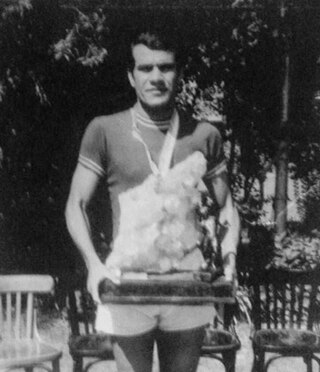
Abdul Razzaq Ahmed Basheer is an Iraqi former football forward who played for Iraq in the 1972 AFC Asian Cup qualification and 1974 FIFA World Cup qualification. He also played for Al-Minaa.
Al-Naqil Sports Club, was an Iraqi sports club based in Baghdad that was founded in 1937 under the name Al-Sikak Al-Hadeed. They were renamed Al-Naqil in 1974, competing in the first season of the Iraqi Premier League and finishing as runners-up.
The 1972–73 Iraq Central FA First Division was the 25th and last season of the Iraq Central FA Premier League ; it began on 16 October 1972. The first half of the season concluded on 31 December 1972 at which point the season was ended; this was due to scheduling difficulties with the Iraq national and military teams' matches that caused the cancellation of the second half of the season. Al-Quwa Al-Jawiya, who led the table at the halfway point having won all of their seven games, were thus crowned champions for their fourth league title.
In March 1972, Ba'athist Iraq proposed to Egypt and Syria a re-establishment of the United Arab Republic, which failed in 1963. The Iraqi proposal was an immediate reaction to Jordan's proposal for a United Arab Kingdom but collided with the already established Federation of Arab Republics and failed because of Iraqi–Syrian differences.
Iraq's rivalry with Kuwait was once considered the Arab world's greatest football rivalry of all time. It began in the mid-1970s. In August 2, 1990, the rivalry between the two switched from the football field to the battlefield, during the Iraqi invasion of Kuwait. Because of the Gulf War, Iraq and Kuwait were in complete avoidance and never met for more than a decade. Iraq and Kuwait have played 37 matches against each other with 17 victories for Iraq, 10 draws, and 10 victories for Kuwait.
